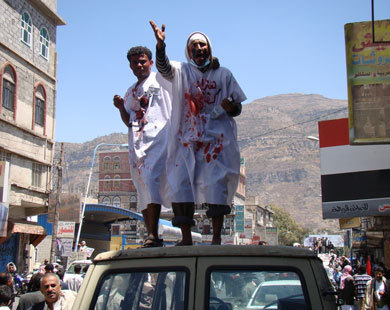
"No immunity, no guarantee to Saleh and his aides," they chanted. "Any immunity offered is rejected by our people."
Other protests were held in major cities across the country -- Taez, Ibb and Hudaydah -- rejecting the immunity law for Saleh and his aides.
The law was drafted on Sunday by the transitional government that was formed after Saleh signed a Gulf plan easing him out of office by the end of February.
Protesters want those accused of killing demonstrators to face justice.
Parliament has yet to convene to ratify the law.
UN envoy to Yemen Jamal Benomar, a key mediator throughout the crisis, arrived in Sanaa on Thursday and met Vice President Abdrabuh Mansur Hadi -- who will be elected to replace Saleh next month -- state news agency Saba reported.
"The UN Security Council will hold a meeting on January 25 in which I will present a report on what has been implemented from the Security Council resolution (on Yemen) and the roadmap," Saba quoted Benomar as saying.
On October 21, the Security Council unanimously passed Resolution 2014 condemning the Yemeni government crackdown on the anti-government protest movement and called on Saleh to sign the Gulf initiative.
In November, Saleh signed the UN-backed deal brokered by the Gulf Cooperation Council (GCC) aimed at ending the political crisis in the impoverished country.
Under the deal, he handed authority to Hadi, and the opposition formed a national unity government.
Saleh serves now as honorary president until polls are held in February to elect Hadi as his successor.
The bloody crackdown on anti-Saleh demonstrations that erupted in January 2011 has claimed hundreds of lives.
Rights groups have slammed the immunity law, while UN High Commissioner for Human Rights Navi Pillay said anyone who had committed abuses during the mass protests in Yemen must not be allowed to evade justice.
Pillay urged decision-makers in Sanaa to respect the prohibition in international law against amnesties for gross human rights violations.
But the United States on Monday defended the draft amnesty law, saying that the Gulf-brokered deal contained a provision for an amnesty that had to be implemented by Hadi and the opposition.
-------------------------------------------------------------------------------------
Other protests were held in major cities across the country -- Taez, Ibb and Hudaydah -- rejecting the immunity law for Saleh and his aides.
The law was drafted on Sunday by the transitional government that was formed after Saleh signed a Gulf plan easing him out of office by the end of February.
Protesters want those accused of killing demonstrators to face justice.
Parliament has yet to convene to ratify the law.
UN envoy to Yemen Jamal Benomar, a key mediator throughout the crisis, arrived in Sanaa on Thursday and met Vice President Abdrabuh Mansur Hadi -- who will be elected to replace Saleh next month -- state news agency Saba reported.
"The UN Security Council will hold a meeting on January 25 in which I will present a report on what has been implemented from the Security Council resolution (on Yemen) and the roadmap," Saba quoted Benomar as saying.
On October 21, the Security Council unanimously passed Resolution 2014 condemning the Yemeni government crackdown on the anti-government protest movement and called on Saleh to sign the Gulf initiative.
In November, Saleh signed the UN-backed deal brokered by the Gulf Cooperation Council (GCC) aimed at ending the political crisis in the impoverished country.
Under the deal, he handed authority to Hadi, and the opposition formed a national unity government.
Saleh serves now as honorary president until polls are held in February to elect Hadi as his successor.
The bloody crackdown on anti-Saleh demonstrations that erupted in January 2011 has claimed hundreds of lives.
Rights groups have slammed the immunity law, while UN High Commissioner for Human Rights Navi Pillay said anyone who had committed abuses during the mass protests in Yemen must not be allowed to evade justice.
Pillay urged decision-makers in Sanaa to respect the prohibition in international law against amnesties for gross human rights violations.
But the United States on Monday defended the draft amnesty law, saying that the Gulf-brokered deal contained a provision for an amnesty that had to be implemented by Hadi and the opposition.
-------------------------------------------------------------------------------------









 Home
Home Politics
Politics









